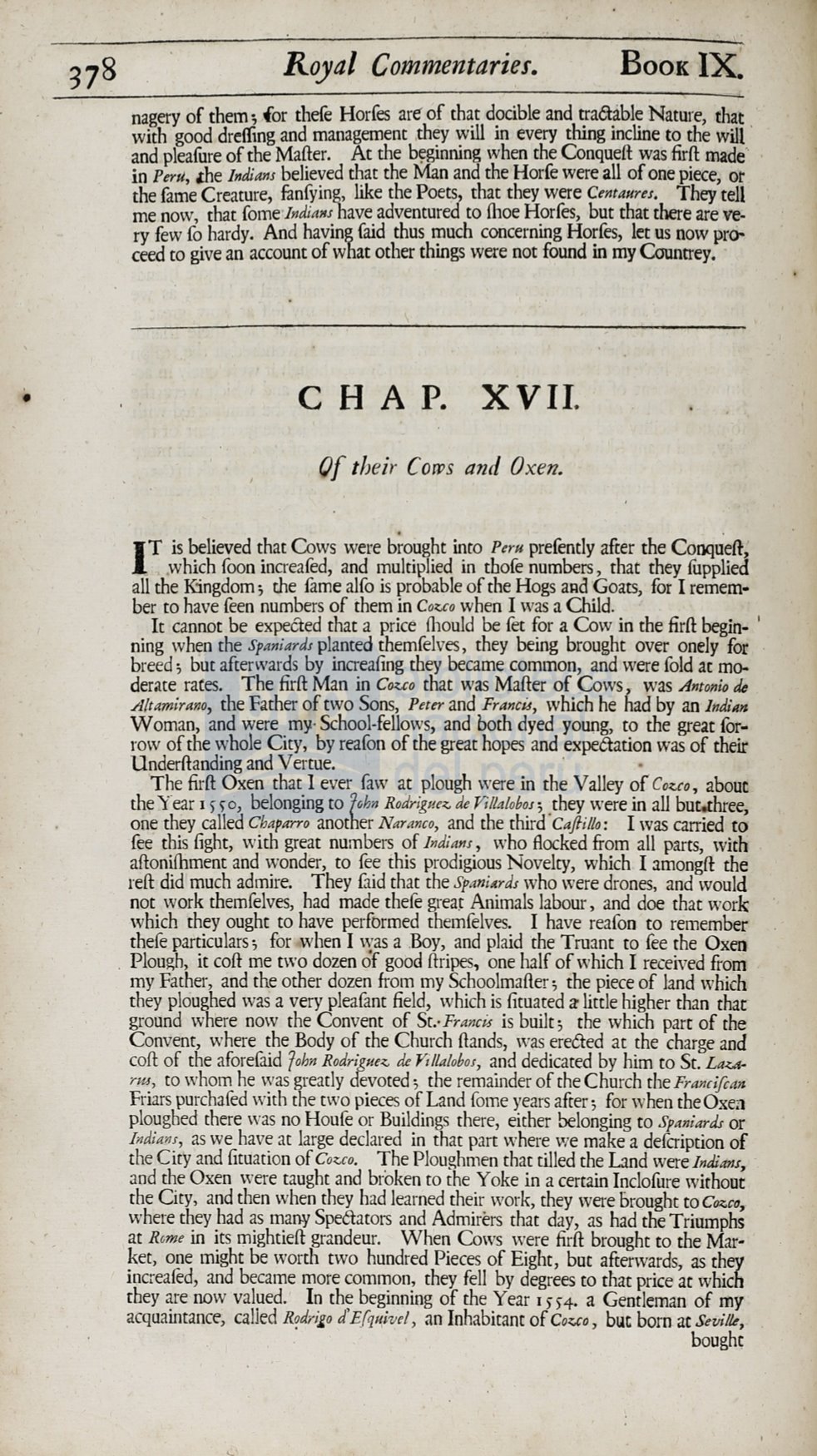

37~
•
R.oyal
Commentari~s.
BooK
IX.
nagery of them; for thefe Horfes aré of th~t d?cible and ~raét~bl<: Nature, ~hat .
with good dreffing and management ,th<:Y
~ill
m every thing incline to the will_
and pleafure of the Ma~er. At the b~gir::inmg when the Conqueft was
fu~
made·
in
Peru
ibe
Jndians
beheved that the Man and the Horfe were ali of oae p1ece, ot
the fa~e Creature, fanfying, like rhe Poet_s, that they were
Centaures.
They tell
me now that
fome·Jndians
have adventured to fhoe Horfes, but that there are
ve–
ry few
fo
hardy. And having faid thus ~uch concerning Ho~fes, let us now pre;;.
ceed
to
give an account of what other thmgs were not found mmy Countrey.
CH A P.
XVII.
O[ their Cows and Oxen.
I
T is belíeved that Cows were b~ought ínto
Peru
prefently after the Conqueíl;
. which foon increaíed, and multiplied in tboíe nurnbers , that they fupplíed
all the K:ingdom; che fame alfo is probable ofthe Hogs ai:id ·Goats, for I rernem–
ber to have feen numbers of thern in
Couo
when I was a Child.
le
cannot be expeéted that a pricé íhould be íet for a Cow in the firíl: begin- '
ning when rhe
Spaniards
planted themíelves, they being brought over onely for
.
breed ; bue afcerwards by increaíing tbey became common, and were fold at mo–
derare races. The firíl: Man in
Couo
that was Maíl:er of Cows was
Antonio
de
A/tamirano,
the Father of two Sons,
Peter
and
Francú,
which he had by an
J11di11n
Woman, and were my·School-fellows, and both dyed young, to the great for–
row ofche whole Cicy, by reafon of the great hopes and expeétation was of their
Underíl:anding and Vertue.
·
·
The
fütl:
Oxeo that
l
ever faw at plough were in the Valley of
Couo ,
abouc
che Year
1 ,
s-
o,
belonging to
flihn Rodrigue,:, de Villa!obo1;
.
rhey were in all but.rhree,
one they called
Chaparro
another
Naranco,
and the third
Caftillo:
I was carried
to
[ee this fight, with great numbers of
Jndians,
wbo flocked frorn ali pares, with
aíl:oniíhrnent and wonder, to íee this prodigious Novelcy, which I :imongft che
reíl: did much admire. They fuid that che
Spani11rd1
who were drones, and would
not work themfelves, had made theíe grear Animals labour, and doe that work
which they ought
to
have performed rhemíelves.
I have reafon to remember
theíe particulars; for when I ~as a .Boy, and plaid che Tru:int to fee che
Oxen
. Plough, it cofi me two dozen of good íl:ripes, one half of which I received from
my Father, and rhe otber dozen from my Schoolmaíler; the piece of land which
rhey ploughed was a very pleafant field, which is füuaced
a-
litcle higher tban chac
ground where now che Convent of St.·
Francu
is built; che which part of che
Convenc, where che Body of che Churcb íl:ands, was ereéted at rhe charge and
coíl: of the aforefaid
'/ohn Rodrigue,:,
de
Villalobos,
and dedicated by bim to St.
Lau–
rm,
to whom he was greacly devoced; the remainder of che Church the
Francifcan
Friars purchaíed with rhe two pieces of Land fome years afrer; for when rheüxeri
plougbed chere was no Houfe or Buildings chere, eicher belonging
to
Spaniards
or
Jndians,
as we have at large declared in that part where we rnake a deícription of
the Cicy and íituation of
Co,:,co.
The Ploughmen chat tilled the Land were
Jndi11n1,
and che Oxeo were caugbt and broken co the Yoke in a certain lnclofüre witbouc
che Cicy, and tben when chey had learned their work, cbey were órought
t0Co,:,c11,
where they had as man.y Speétators and Admirers chac day, as had che Triumphs
at
R&me
in its ¡pighcieíl: grandeur. When Cows were firíl: brought to tbe Mar–
kec, one might be worch two hundred Pieces of Eight, but afterwards, as they
increaíed, and became more cornmon, tbey fell by degrees
to
that price ac which
rbey are now valued.
In
the beginning of the Year
I
s-
54.
a Gentleman of
my
acquaintance, called
Rodri¡,o d'EfquJvel,
an Inhabitant of
Cow,
but born ac
Se-vil~,
.
~~














